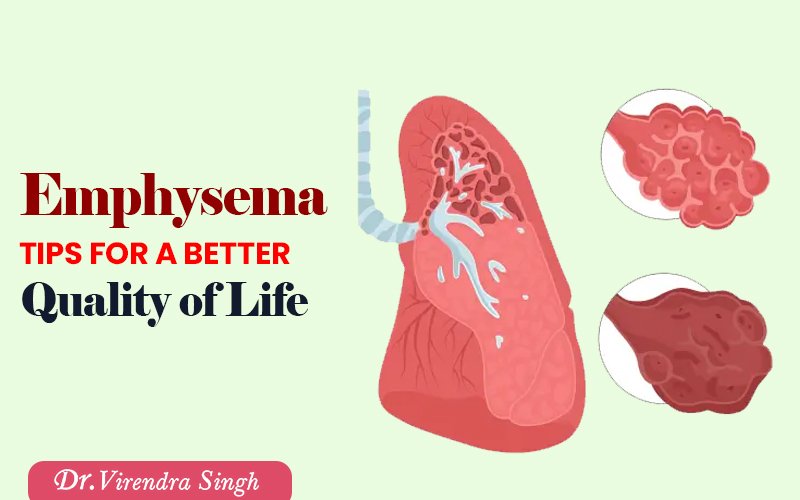
Emphysema is a lung disease. Smoking is the primary cause of emphysema, though air pollution and chemical fumes may also be involved. Among the symptoms are exhaustion, shortness of breath, and coughing. Emphysema can be diagnosed by your doctor using breathing and imaging tests. Taking medicine and giving up smoking are part of the treatment. As the walls of these air sacs degenerate and rupture over time, reducing the surface area available for oxygen exchange, breathing becomes difficult. The most common cause of emphysema is long-term exposure to irritants such as air pollution, cigarette smoke, or occupational dust and chemicals. Shortness of breath, persistent coughing, wheezing, and exhaustion are common symptoms that progressively get worse as the illness worsens.
Dr. Virendra Singh, a well-known pulmonologist and chest specialist from Jaipur who has been helping patients with lung diseases like emphysema and COPD for many years. Emphysema is a dangerous illness that makes breathing difficult by damaging the lungs’ air sacs. He uses his extensive experience to help individuals manage their symptoms, comprehend the illness, and enhance their quality of life. In addition to administering medications and therapies, he counsels patients on lifestyle modifications, smoking cessation, and the use of basic breathing techniques to strengthen the lungs. Dr. Virendra Singh has become a trusted guide for people living with emphysema, offering them hope and better ways to cope with illness.
What are the First Signs of Emphysema?
Many people don’t experience the symptoms of emphysema until at least 50% of their lung tissue has been destroyed. Until then, the initial symptoms are exhaustion and a progressive shortness of breath. Other emphysema symptoms include;
- Wheezing
- Chronic coughing
- Persistent sensation of insufficient air intake
- Breathlessness, particularly when engaging in mild exercise like climbing stairs
- Increased mucus production
- Tightness in your chest
- Ongoing fatigue
- Heart problems
- Abnormal mucus color
- Trouble sleeping
- Depression
- Anxiety
- Weight loss
What is the Main Cause of Emphysema?
Smoking is the main cause of emphysema. In addition to irritating your airways, cigarette smoke damages the tissue in your lungs. Smoking cigarettes destroys your cilia and produces inflammation. Mucus production, airway edema, and trouble cleaning your airways can all be caused by irritation and broken cilia. Breathlessness may result from any of these changes. Emphysema is primarily caused by smoking, though there are other contributing causes. These include:
- Vaping and E-Cigarettes
- Marijuana
- Toxins in the air
- Cigar smoke
- Dust
- Chemical fumes
What Distinguishes Chronic Bronchitis from Emphysema?
COPD includes both emphysema and chronic bronchitis. Many people simultaneously have both. An illness that damages the alveoli in your lungs is called emphysema. Breathlessness is the main sign of emphysema. A lung disease called chronic bronchitis damages the cilia in your airways. Your airways are cleaned of germs and other debris by cilia, which are hair-like parts of cells. Mucus production, which includes a wet cough that causes the release of thick, discolored yellow, green, or yellow-grey mucus from your lungs (productive cough), is the main symptom of chronic bronchitis. Coughing and dyspnea are signs of emphysema.
What are the Stages of Emphysema?
The Global Initiative for Chronic Obstructive Lung Disease (GOLD) divides COPD into four stages. While emphysema can lead to COPD, not all emphysema patients also have COPD. Healthcare professionals explain emphysema using the phases of COPD. The stages are:
- Stage 1: This is the mildest stage of emphysema. Healthy lungs function at least 80% as well as yours in a person of the same age, height, and sex.
- Stage 2: This is moderate emphysema. Like the healthy lungs of a person of the same age, height, and sex, your lung function varies from 50% to 79%.
- Stage 3: This is severe emphysema. Your lungs, like those of a person of the same age, height, and sex, function between 30 and 49 percent of the time. Less than 30% of lungs perform worse than the healthy lungs of a person of the same age, height, and sex.
- Stage 4:This is very emphysematous. The healthy lungs of a person of the same age, height, and sex perform better than less than 30% of lungs.
Diagnosis and Tests
How is Emphysema Diagnosed?
Your healthcare provider can diagnose emphysema. However, based only on your symptoms, they are unable to diagnose emphysema. A physical examination will be conducted by your healthcare practitioner. A stethoscope, sometimes called auscultation, will be used to listen to your lung sounds throughout the physical examination. A thin metal disc called a diaphragm is part of the stethoscope, a medical device that connects to earpieces using rubber tubing. Your physician will tap your chest while pressing their stethoscope against it to listen for a hollow sound. Your lungs are holding air if you hear a hollow sound. They’ll then order tests to confirm emphysema.
What Tests will be done to Diagnose Emphysema?
To diagnose emphysema, your doctor could prescribe the following tests:
- Chest X-ray: Our healthcare expert will examine your lungs by taking chest X-rays. They will contrast your lungs with X-rays of lungs in good health. Early emphysema detection is typically not possible with X-rays. When diagnosing mild or severe emphysema, they are more helpful.
- CT Scan: A CT scan produces a three-dimensional picture of your lungs. Compared to an X-ray, it produces images with greater detail.
- Pulmonary Function Testing: Tests of pulmonary function evaluate how well your lungs take in and release air. Spirometry is one type of testing. Spirometry measures the airflow through your lungs using a spirometer machine. It also calculates how much air is in your lungs.
- Arterial Blood Gas: The amount of carbon dioxide and oxygen in arterial blood, or blood from an artery, is measured by an ABG. The tube that transports blood from your heart is called an artery.
- Electrocardiogram: Heart function is checked by an EKG. Your doctor can request an EKG to rule out heart disease as the reason for your dyspnea.
- Blood Tests: Your doctor can prescribe genetic and blood testing to confirm that alpha-1 antitrypsin deficiency is the cause of your emphysema.
FAQs
What is Emphysema?
Emphysema is a long-term lung condition that damages the lungs’ air sacs, making breathing challenging.
What causes emphysema?
It is mostly caused by chronic smoking, but it can also be brought on by dust, chemicals, and air pollution.
What are the common symptoms of emphysema?
Shortness of breath, wheezing, chronic cough, wheezing, and fatigue are the most common symptoms.
Is emphysema the same as COPD?
COPD (Chronic Obstructive Pulmonary Disease) includes both chronic bronchitis and emphysema.
How is emphysema diagnosed?
Doctors use lung function tests, CT scans, chest x-rays, and medical history to diagnose emphysema.
